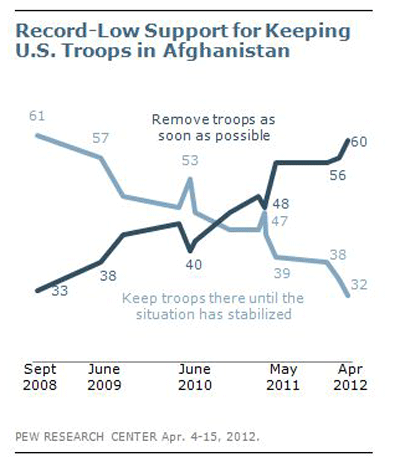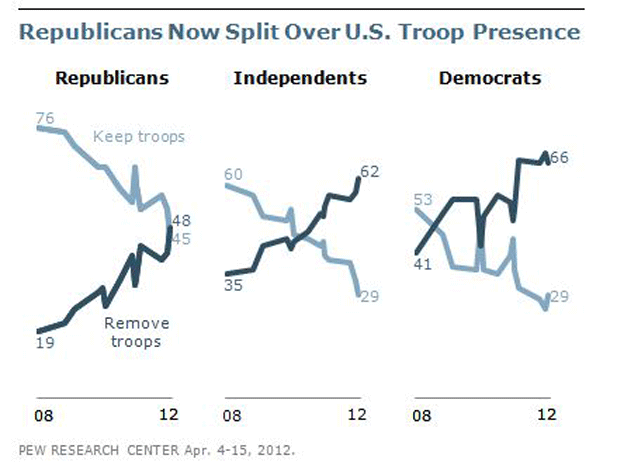Is Afghanistan a Problem for Mitt Romney?

More on:
I noted in a post this morning that Americans have less confidence in Mitt Romney than Barack Obama when it comes to foreign policy. Moments after that post went up the Pew Research Center released a new poll. It shows the challenge Romney faces in closing the gap with the president on foreign policy.
The issue in question is Afghanistan. Pew found that public support for keeping U.S. troops in Afghanistan has hit a new low. Sixty percent of voters want to see U.S. troops come home as soon as possible. That’s up from 48 percent a year ago.
Okay, no real surprise here. Just the continuation of a trend that has been underway for a while. The interesting news comes when you examine opinion by party. Two-thirds of Democrats and 65 percent of voters who say they support President Barack Obama also favor a rapid troop withdrawal. That’s good news for the White House. The even better news is that support for a rapid troop withdrawal is nearly as high among Independents (62 percent) and among undecided or swing voters (59 percent). So Afghanistan shouldn’t damage Obama much politically. He’s drawing down troops, which is what the public wants, and he can deflect questions about the speed of their departure by saying that a more rapid draw down would endanger American (and Afghan) lives.
Things look different, however, on the Republican side of the ledger. Among Republicans as well as among voters who say they are certain they will vote for Mitt Romney, 48 percent favor removing troops as soon as possible, while 45 and 46 percent, respectively, support keeping U.S. forces there until the situation is stabilized.
These numbers point to Romney’s political bind. He has talked tough on Afghanistan ever since last June, when Republican national security conservatives blasted him for what they saw as his insufficient commitment to the mission there. Romney responded with much tougher rhetoric even though the policies he favors look a lot like Obama’s. Now that Romney has the nomination locked up he could dial back his rhetoric, emphasize his desire to depart Afghanistan, and thereby keep pace with where public sentiment is headed. But doing that risks alienating a sizable chunk of his base and potentially confirming the charge that he is a flip-flopper. Conversely, Romney could stick with the tough talk, but that risks putting him at odds with voters. Ironically, that would confirm a different, but equally damaging charge that Romney has been trying to fight off, namely, that he is out-of-touch with the American public.
Of course, what Romney decides to say on Afghanistan won’t matter much if November brings a lopsided election. But it could in a tight race. In that case, even a few votes could spell the difference between watching the inaugural address and giving it.
More on:
 Online Store
Online Store

